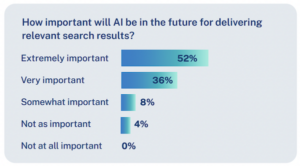
New Enterprise Search Report Shows How Data and AI Can Increase Relevant Results

Delivering relevant search results can be a major challenge for enterprises. Relevant search results, or how closely a platform’s generated search results relate to user intent, are crucial for a successful user experience. Businesses are looking for solutions to enhance search functionality, and many are turning to data-driven insights and AI for help.
Lucidworks is a San Francisco-based company offering an enterprise search platform used by companies like Reddit. The company recently conducted a research survey aimed at gathering insights from over 50 thousand search practitioners on the methods they are using to improve search relevance.
Search relevance was ranked as Highly Important by 100% of survey respondents. This is unsurprising, as the report notes that poor search relevance leads to frustration, decreased trust, and even loss of business. The difficulty of delivering relevant search was another key finding, as 96% of those surveyed said they had a medium or high difficulty in this area, with only 4% reporting low difficulty.
The survey sought to find the biggest hurdle search practitioners face when finding resources and technology to enhance the effectiveness of search. One respondent answered that it is difficult to show relevant results, as well as to autocorrect what the user meant to type in order to guide them to the right place. Data-related struggles were also reported, as another respondent answered that having relevant, specific, and consistent product data was a challenge. For others, collecting quality signal data regarding search relevance through data analytics reports is a difficult task.
How are search professionals working through these hurdles? Through data! One way to gain insight is to collect the most accurate signal data possible, which was listed as most important by 36%. Signal data is the information collected from user interactions within a search platform to aid in understanding user behavior and preferences. This data is collected from areas like beacons, data streams, customer data platforms, and behavior tracking and can include elements like search queries, click-through rates, time spent on pages, search results rankings, and navigation patterns. Signal data can be analyzed to refine and improve search algorithms, and 34% of those surveyed listed this as the most important way to deliver search relevance.
“Today’s users provide a wealth of data and signals from clicks, purchases, and implicit inputs from customer data platform information. The opportunity to deliver a highly relevant search experience, in real-time, is realistic. Companies that do this the best will drive optimal results from their search management efforts,” said Lana Klestoff, Lucidworks chief customer officer, in the report.
In addition to properly collecting and using the data, another area that holds promise for search is artificial intelligence solutions. The survey asked participants how they felt about artificial intelligence and its role in the future of search. Of the respondents, 88% said AI will be important for delivering relevant search and 52% said AI will be extremely important.
AI has been a boon to search relevance through algorithms that can interpret the user intent behind a search query. Natural language processing is the technology behind large language models like GPT-4 that powers ChatGPT, and this is one way to analyze the structure and context of a user’s search query to better understand their intent. AI can also help with personalizing the user experience to aid in boosting relevance, as the algorithms can use information like a user’s search history, location, and preferences to tailor search results. One example is how Lucidworks uses AI to recommend products based on a user’s past purchases and searches. Algorithms can also identify and nix low-quality search results, as well as analyze the quality of content to decide if it is relevant and trustworthy enough to be included in results.
“AI will not solve all search issues, but harnessing what it does best—complex processes at scale—is a natural application to the immense data sets and models that help make search and browse more relevant,” noted Melissa Hill, Lucidworks VP of product management.
Read the full report here.
Related Items:
Companions, Not Replacements: Chatbots Will Not Succeed Search Engines Just Yet
Research Experiment Pits ChatGPT Against Google Search, ChatGPT Wins
Kyndi Bolsters NLP with Search-as-a-Service

































